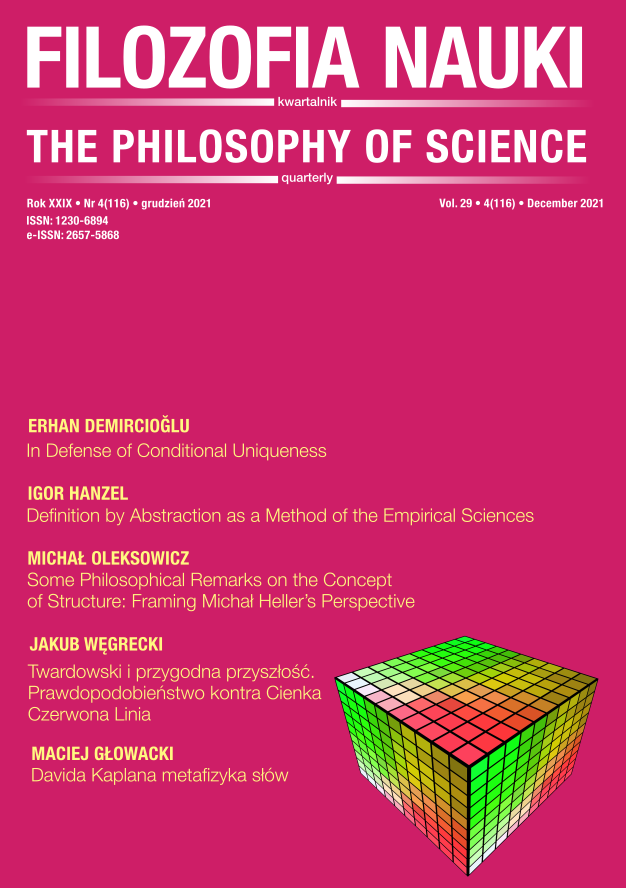In Defense of Conditional Uniqueness
DOI:
https://doi.org/10.14394/filnau.2021.0020Słowa kluczowe:
rationality, evidence, uniqueness, permissivism, rational belief, evidential support, Roger WhiteAbstrakt
The Uniqueness Thesis (U), defended by the uniquer and rejected by the permissivist, asserts that, necessarily, there is at most one rational doxastic attitude one can take towards a proposition, given a particular body of evidence. U faces a well-known, paralyzing objection from the permissivist, which I call “the simplicity objection,” which rests on the idea that evidence is not the sole determinant of rationality. In this paper, after maintaining that the ongoing dialectic between the uniquer and the permissivist has led to an exaggeration of differences, I bring into focus another, non-equivalent yet substantive (non-trivial) thesis in the vicinity, which I call “the Conditional Uniqueness Thesis” (U*), according to which if evidence is the sole determinant of rationality, then U is true. The hope is to achieve a rapprochement between the uniquer and the permissivist by showing that U* is true. To this end, I examine the argument Roger White offers in favor of U, which I call “the argument from evidential support” (AES), and argue that it is both unpersuasive for the defender of the simplicity objection and unnecessarily strong for establishing its own conclusion. I then offer a sufficiently weakened version of AES, which I call AES*, and argue that AES* is sound, if interpreted as an argument for U*.
Bibliografia
Ballantyne N., Coffman E. (2011), “Uniqueness, Evidence, and Rationality,” Philosophers’ Imprint 11, 1-13.
Decker J. (2012), “Disagreement, Evidence, and Agnosticism,” Synthese 187, 753-783. https://doi.org/10.1007/s11229-011-0010-x
Demircioğlu E. (forthcoming), “Conditional Uniqueness,” Organon F.
Donnellan K. (1977), “The Contingent A Priori and Rigid Designators,” Midwest Studies in Philosophy 2, 12-27. https://doi.org/10.1111/j.1475-4975.1977.tb00025.x
Douven I. (2009), “Uniqueness Revisited,” American Philosophical Quarterly 46, 347-361.
Dummett M. (1973), Frege, Cambridge, MA: Harvard University Press.
Evans G. (1979) “Reference and Contingency,” The Monist 62(2), 161-189. https://doi.org/10.5840/monist197962220
Fantl J., McGrath M. (2002), “Evidence, Pragmatics, and Justification,” The Philosophical Review 111(1), 67-94. https://doi.org/10.1215/00318108-111-1-67
Feldman R. (2006), “Epistemological Puzzles about Disagreement” [in:] Epistemology Futures, S. Hetherington (ed.), Oxford: Oxford University Press, 216-236.
Feldman R., Conee E. (1985), “Evidentialism,” Philosophical Studies 48(1), 15-34. https://doi.org/10.1007/BF00372404
Hawthorne J. (2004), Knowledge and Lotteries, Oxford: Oxford University Press. https://doi.org/10.1093/0199269556.001.0001
Hedden B. (2015), “A Defense of Objectivism about Evidential Support,” Canadian Journal of Philosophy 45(5), 716-743. https://doi.org/10.1080/00455091.2015.1123038
Kelly T. (2014), “Evidence Can Be Permissive” [in:] Contemporary Debates in Epistemology, M. Steup, J. Turri, E. Sosa (eds.), Hoboken: John Wiley & Sons, 298-313.
Kopec M., Titelbaum M. (2016), “The Uniqueness Thesis,” Philosophy Compass 11(4), 189- 200. https://doi.org/10.1111/phc3.12318
Kripke S. (1980), Naming and Necessity, Cambridge, MA: Harvard University Press.
Matheson J. (2011), “The Case for Rational Uniqueness,” Logos & Episteme 2, 359-373. https://doi.org/10.5840/logos-episteme20112319
Meeker K. (2004), “Justification and the Social Nature of Knowledge,” Philosophy and Phenomenological Research 69, 156-172. https://doi.org/10.1111/j.1933-1592.2004.tb00388.x
Pollock J. (1986), Contemporary Theories of Knowledge, Lanham, Md.: Rowman & Littlefield.
Salmon W. (1967), The Foundations of Scientific Inference, Pittsburgh: University of Pittsburgh Press. https://doi.org/10.2307/j.ctt5hjqm2
Salmon N. (1986), Frege’s Puzzle, Cambridge, MA: MIT Press.
Soames S. (2003), Philosophical Analysis in the Twentieth Century. Vol. 2: The Age of Meaning, Princeton: Princeton University Press. https://doi.org/10.1515/9781400 825806
Stanley J. (2005), Knowledge and Practical Interests, Oxford: Clarendon Press. https://doi.org/10.1093/0199288038.001.0001
Titelbaum M. (2011), “Not Enough There There: Evidence, Reasons, and Language Independence,” Philosophical Perspectives 24, 477-528. https://doi.org/10.1111/j.1520-8583.2010.00201.x
White R. (2005), “Epistemic Permissiveness,” Philosophical Perspectives 19(1), 445-459. https://doi.org/10.1111/j.1520-8583.2005.00069.x
White R. (2014), “Evidence Cannot Be Permissive” [in:] Contemporary Debates in Epistemology, M. Steup, J. Turri, E. Sosa. (eds.), Hoboken: John Wiley & Sons, 312-323.



















 Filozofia Nauki | ISSN 1230-6894 | e-ISSN 2657-5868
Filozofia Nauki | ISSN 1230-6894 | e-ISSN 2657-5868